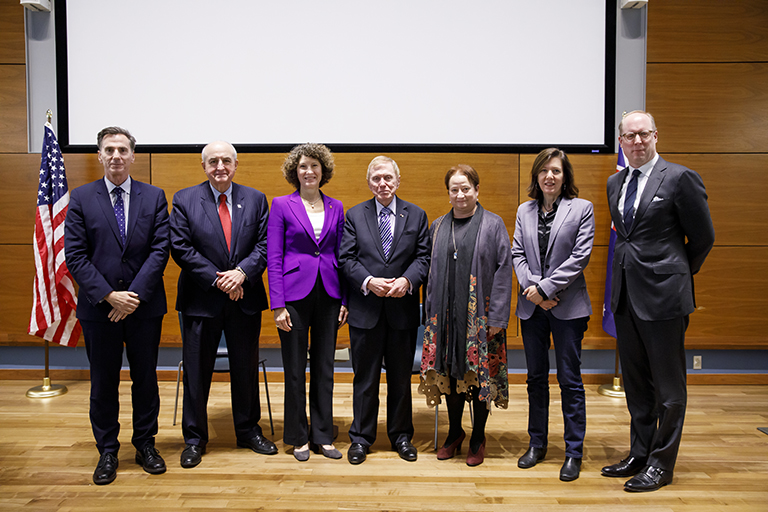Introduction
It is a great pleasure to be here this afternoon to introduce the keynote speaker for the workshop on “Navigating the Backlash Against Global Law and Institutions,” which will be held tomorrow. It is the second in a series of three workshops that examine the developing role of international law and institutions amid challenges in areas such as trade, human rights, and global governance. These three workshops are part of a collaboration led by colleagues from the Australian National University, the University of Maryland, and Indiana University.
Today’s lecture also serves to launch “International Law and Institutions Week” at Indiana University, during which a number of thematic and career-related events and programs will be available for students.
It also celebrates the formal launch of the new IU joint major in International Law and Institutions, a collaboration between IU’s Hamilton Lugar School of Global and International Studies and the Maurer School of Law. I want to commend deans Lee Feinstein of the Hamilton Lugar School and Austin Parrish of the Maurer School, as well as IU faculty members Shruti Rana and Christiana Ochoa for their leadership in establishing this innovative new program that offers student the opportunity to become immersed in the understudied area of law in international affairs. Students In the program are taught by faculty from both the Hamilton Lugar School and the Maurer School, and the program provides a rare opportunity for undergraduate students to take classes at the law school.
Given the topic of this workshop and the focus of this innovative new major at Indiana University, I am very pleased to welcome our keynote speaker, a man who has, throughout his career, been an advocate for strengthening and upholding the hard-won multilateral agreements and institutions that support the international rule of law—my friend and fellow Australian, the Honorable Justice Michael Kirby.
Michael Kirby's Distinguished Career
Justice Kirby’s service in Australia’s federal courts began in 1974, when he served as Deputy President of the Australian Conciliation and Arbitration Commission, a branch of the judiciary concerned with labor law. He would go on to serve as the first chair of the Law Reform Commission, as president of the New South Wales Court of Appeal, and as president of the Court of Appeal of the Solomon Islands.
In 1996, he was called to serve as Justice of the High Court of Australia, equivalent to the U.S. Supreme Court. When he retired from the High Court in 2009 as the longest-serving federal judge in Australian history, Justice Kirby was widely praised as a tireless advocate of legal reform who left an indelible impression on Australia’s legal landscape.
Time will not allow me to list the large number of international commissions and working groups on which Justice Kirby has served—and which he has led—groups that have addressed matters of immeasurable global importance. Allow me to give just a few highlights.
Justice Kirby served as Special Representative of the Secretary General of the United Nations for Human Rights in Cambodia—an assignment that took him into harm’s way as he travelled through regions where foreign tourists had recently been murdered.
He drew on his interest and expertise in issues of biomedical policy, ethics, and regulation to help shape national and international legal responses to AIDS and HIV through his leadership of the World Health Organization’s Global Commission on AIDS and other organizations.
His chaired the Organization for Economic Co-operation and Development’s Expert Group on Data Security—a group that generated the guidelines that form the foundation of modern privacy and data security law.
He also chaired the UN Human Rights Council's Commission of Inquiry on human rights violations in North Korea. In 2014, the commission issued a devastating report on North Korea’s human rights abuses committed against its own people.
More recently, he served as a member of the UN Secretary General's High-Level Panel on Access to Medicines. The panel’s landmark report, issued in 2016, was praised for its recommendations that would help ensure that all people have access to affordable, quality medicines.
Justice Kirby is also a tireless advocate for gay rights. Earlier this year, he married his partner, Johan van Vloten, on the 50th anniversary of the day they met.
And, of course, he has given years of service to Indiana University—as a member of the Kinsey Institute’s Board of Governors, as a two-time Branigin lecturer at the invitation of IU’s Institute for Advanced Study, as IU’s first George P. Smith Distinguished Professor and Chair in the Maurer School of Law, and as IU’s 2009 Commencement speaker. During that Commencement ceremony, I was very pleased to present Justice Kirby with an honorary IU doctorate.
Time will also not allow me to list the many accolades he has received. These include the Australian Human Rights Medal, the inaugural Australian Privacy Medal. the Gruber Prize for Justice, and being named Laureate of the UNESCO Prize for Human Rights Education.
He has—by last count—been awarded 29 honorary doctorates from institutions around the world.
Introducing the Honorable Justice Michael Kirby
All of these titles and awards only begin to suggest Michael Kirby’s courage, compassion, and the ways in which he has embodied the essence of the humanitarian impulse that has moved people to compassionate action throughout history.
Throughout his life, he has been a global crusader for justice, a defender of human rights, and a tireless advocate for the long-established international laws and multilateral practices that have contributed so much to the world since the Second World War, and which are today being devalued and threatened by the global rise of geopolitical tensions, nationalist populism, and growing distrust in governments and the institutions of civil society.
And so, it is my honor and privilege to welcome to the podium to speak to us on “‘International Affairs: the Assault on Multilateralism,” the Honorable Justice Michael Kirby.


